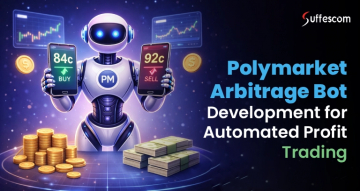Afterpay Clone Development: Tap into the BNPL Market

The Buy Now Pay Later (BNPL) model isn’t new. It first appeared in the 19th century as installment plans for furniture and home goods. Fast forward to today, and it has evolved into a digital-first financial service that’s reshaping how people shop. Apps like Afterpay, Klarna, and Affirm have turned BNPL into a mainstream payment method used by millions.
Consumers want flexibility, and businesses want higher sales. BNPL bridges that gap. The market was worth $1.64 billion in 2022 and is projected to hit $33.4 billion by 2033, growing at a CAGR of 24.3%. Millennials and Gen X are driving adoption, and merchants are rushing to integrate BNPL solutions to keep up.
If you’re looking at entering fintech, this is your window. Building an Afterpay clone app means you can tap into a fast-growing market with proven demand. Let’s break down why BNPL is booming, what features your Afterpay clone should have, and how to actually build it.
Leave a Mark in the Fintech Industry with Afterpay Clone Development Services
Make hay while the sun still shines with promising Afterpay clone development services. Get the same but improved features to market the app quickly. Connect now and get a no-cost app consultation.
Why is BNPL Growing?
Credit cards are no longer in mainstream popularity. As consumers are looking for better alternatives and avoid accumulating debt, BNPL is emerging as the ideal choice.
BNPL ensures-
- Credit flexibility
- short repayment terms
- better shopping experience
Various economic, social, and political factors ensure an industry's exponential growth. Let’s analyze the factors behind BNPL’s growth.
Supreme Convenience
Convenience is the most influential factor driving BNPL's growth. It allows consumers to purchase goods and services without having to pay the full amount in one go. Thus, it becomes an ideal choice for those in urgent need but are short on funds.
BNPL distributes the costs over time, making it easier for consumers to practice effective financial management.
Wide Adoption by Young Consumers
Besides convenience, BNPL is in greater demand because of its wide adoption by young consumers. As stated above as well-
Millennials and Gen X (young generations) are the most extensive user base of BNPL systems.
BNPL apps like Afterpay are a better alternative to traditional methods for millennials and Gen X. This user category does not consider credit cards or debt a favorable payment method.
Credit Products are Outdated
The changing scenario of the financial services industry is increasing the popularity of BNPL systems. Traditional credit organizations face heavy competition from new-age fintech businesses, which has opened up gates for new afterpay app players to enter the industry, leading to significant growth.
Regulatory and Compliance Changes
Several legal updates tend to alter the way an industry functions. More than this, it can lead to an industry's growth or downfall. Luckily, the latter did not happen to the BNPL. Regulatory and compliance changes have led to BNPL's positive growth.
The Consumer Financial Protection Bureau (CFPB) has played a crucial role in regulating the BNPL industry. These protection measures facilitate Afterpay app like Afterpay, increasing credibility. As a result, consumers trust on afterpay processes as a favorable payment option.
Initiatives by BNPL Players
Several consumers need help understanding the terms and conditions of installment plans, which increases debt and hampers their financial management. Such events are hampering the industry's growth.
To tackle this, BNPL companies like Afterpay are focusing on consumer education and financial transparency. Consumers are getting clear and precise information on payment terms, late fees, or penalties
Why Build an Afterpay Clone App Now
The demand is already here. Consumers love BNPL because it makes shopping easier. Merchants love it because it reduces cart abandonment and increases order values. For startups, the BNPL model is a clear opportunity to enter fintech without reinventing the wheel.
An Afterpay clone app gives you a shortcut to this market. You replicate the successful model, add your own improvements, and launch faster. The sooner you enter, the better your competitive advantage.
Ideal Features To Incorporate in Afterpay Clone Development
The more features are included in the Afterpay-like app development, the more likely the app will stand out. There must be tons of useful features for each user category.
1. Diverse & Real-Time Shopping
Users can shop for a variety of goods using a single tap. The Afterpay clone app lets users shop online for top fashion, beauty, tech, and more brands! It provides real-time product availability and pricing updates for an easy shopping experience.
2. Setting Afterpay Card
A digital Afterpay card enriches the shopping experience and offers benefits like discounts and specialized sales. Users can integrate the card with Google or Apple Wallet for contactless and secure payments.
3. Account Management
It lets users manage personal and payment information, check spending limits, track payment dates, and manage orders. Setting up a user authentication system using Node.js increases app trust and user base.
Afterpay Clone App Development Services Like No Other!
Are you looking for the most proficient Afterpay like app development services? If so, then Suffescom Solutions can be the ideal choice for you.
4. Split Payments
Users split purchase costs into no-interest payments and manage different installment plans and schedules. Payment gateway integration, PCI compliance, and installment scheduling are essentials.
5. Product Wishlists
Create a product wishlist for future purchases and visit the wishlist products whenever ready to purchase. The wishlist functionality increases user engagement and retention.
6. Push Notifications and Alerts
Set up push notifications as soon as the renowned brands start their sales. Users get price drop notifications on the desired products, payment reminders, special offers, and other updates.
7. Pulse Rewards
Shoppers earn reward points for timely payments, benefits on payment dates, and exclusive offers. Real-time rewards increase user engagement and brand loyalty.
8. Spend Limits
Plan and budget efficiently with the Afterpay clone app. The app calculates spending limits based on the user activity and payment history.
9. Payment Rescheduling
Ensure financial flexibility with a provision to reschedule payments, with automated notifications for updated reminders. This allows shoppers to shop at their convenience.
Business Benefits of Afterpay Clone Development
1. Expanding Customer Base: Favours young demographics by providing payment options over upfront costs.
2. Augmenting Sales Volume: Flexible payment methods and easy installments increase average order value as customers buy in large.
3. Enhancing Customer Loyalty: BNPL apps like Afterpay increase brand loyalty by providing transparent information, including order history and loyalty programs.
4. Minimizing Cart Abandonment: The facility to pay in installments reduces cart abandonment, which in turn increases conversions using last-minute discounts.
5. Competitive Advantage: Offering an easy payment solution allows the business to stand out and gain a larger competitive advantage.
6. Improved Cash Flow: The Afterpay clone app is a win-win for both merchants and shoppers, as the former receives payment in full and later can pay in installments.
7. Encouraging Higher Purchase Frequency: Consumers purchase frequently without having to pay the complete amount in one go.
8. Strengthening Brand Perception: A large customer base, customer loyalty, and competitive advantage improve brand perception.
How to Develop an App Like Afterpay?
Here’s a step-by-step breakdown of the BNPL app development process:
Market Research and Analysis
Nothing goes right without effective market research. The foremost process of Afterpay clone development is to incorporate essential features, starting with detailed market research, including-
- Defining problem and objectives
- Designing research plan
- Data collection
- Data analysis
- Interpreting results
- Reporting and presentation
- Decision-making and follow-up
Planning and Conceptualization
Details gathered from planning and conceptualization help in effective planning and conceptualization. These first two steps of the process help lay out the pathways for further steps, including designing and developing the app interface.
The team creates plans for designing UI/UX, developing app interfaces, and arranging resources to conceptualize these plans.
Design and User Experience
The designers start with creating the design derived from the plan. Including UI/UX design elements play a crucial role in defining the differentiating elements of the Afterpay clone.
Appealing app design and user interface must integrate with work accessibility. Before commencing the Afterpay clone app development, wireframe and prototype the app and check how users interact with it (usability testing).
App Development and Integrations
The developers started working to impart codes in the mobile app. The development starts along with integrating e-commerce platforms, payment gateways and other required systems.
Provide real-time credit assessment with non-rigid repayment options and safe payment processing. A dedicated and easy-to-use dashboard tracks transactions and account management.
Testing and Quality Assurance
It is the most essential step in the Afterpay like app development process. Testing and QA practices ensure whether there are any potential errors and the scope of improvements. If found, the designers and developers work again to improve the performance.
The testers apply various testing and QA checks such as:
- Unit testing
- Integration testing
- Functional testing
- End-to-end testing
- User acceptance testing (UAT)
- Performance testing
- Security testing
- Compatibility testing
- Regression testing
Launch and Marketing
The process is not done yet. Launching an app is equally important as designing and developing it. Developing a marketing plan includes a digital marketing plan on social media platforms.
- Highlight unique features
- Implement promotional offers
- Monitor the user feedback
More than launching the Afterpay clone app, it is important to keep it in the top search results. A team of digital marketers implements app store optimization techniques to increase the app’s popularity on the store.
Build App like Afterpay with In Few Steps: Start Business In Days
We design and develop Afterpay clone apps like no one else can. Get market-ready and feature-rich clone apps at the most reasonable prices. Explore now!
Cost to Build an Afterpay Clone
The cost incurred on Afterpay clone development cost ranges from $15,000 to $30,000. However, various factors influence the cost to build an app like Afterpay. Let’s shed some light on those factors-
- App features and functionalities
- Platform selection (ios, android, or both)
- UI/UX design complexity
- Scalable backend development
- Payment gateway integration
- Security and compliance measures
- Data storage and management
- Admin panel development
- Third-party API integrations
- Rewards and loyalty program development
- Post-launch support and maintenance
- Location of the development team
- Project timeline and complexity
Wrapping Up
With 13+ years in fintech app development, Suffescom has delivered hundreds of secure, high-performing apps across finance and eCommerce. We know the BNPL model inside out, from compliance requirements to scaling features.
Our team helps you build, launch, and grow your BNPL app with confidence. From free consultations to post-launch support, we’re your partners in making Afterpay-level success a reality.
Suffescom Solutions is here to deliver promising BNPL App Development solutions. Tap the growth, utilize expert development practices, and maximize returns.
FAQs About Afterpay Clone Development
1. What is an Afterpay clone app?
It’s a BNPL app similar to Afterpay, built with custom features and branding for your business.
2. How does a BNPL app like Afterpay make money?
Revenue comes from merchant fees, late fees, partnerships, and premium services.
3. How long does it take to build an Afterpay clone?
On average, 12 to 16 weeks, depending on features and complexity.
4. What tech stack is best for BNPL app development?
Popular choices include Node.js, React Native, AWS for scalability, and PCI-compliant payment gateways.
5. Is BNPL app development regulated?
Yes. Countries have specific financial regulations, and compliance is essential for user trust.
6. Can small businesses launch a BNPL app?
Absolutely. With the right development partner, even startups can launch a competitive BNPL app.







